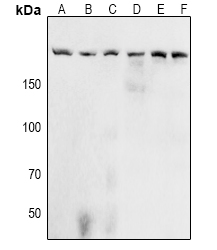Product Name :
Acinus (Phospho-S1180) polyclonal antibody Background :
Acinus (apoptotic chromatin condensation inducer in the nucleus) is a caspase substrate that has been implicated in nuclear changes during apoptosis. Chromatin condensation and DNA fragmentation are both nuclear morphological features associated with apoptosis. Acinus is expressed in different isoforms (L, S, S') most likely generated by alternative splicing. During apoptosis Acinus is cleaved by caspase-3 to generate a 23 kDa fragment that was reported to induce chromatin condensation. Acinus has been identified to be a component of the spliceosome complex, ASAP, suggesting a role in pre-mRNA processing. Down regulation of Acinus by RNA interference inhibits cell growth (5). This study also found that loss of Acinus inhibits DNA fragmentation but not chromatin condensation during apoptosis. Product :
Rabbit IgG, 1mg/ml in PBS with 0.02% sodium azide, 50% glycerol, pH7.2 Storage&Stability :
Store at 4°C short term. Aliquot and store at -20°C long term. Avoid freeze-thaw cycles. Specificity :
Acinus (Phospho-S1180) polyclonal antibody detects endogenous levels of Acinus protein only when phosphorylated at Ser1180. Immunogen :
Synthetic phosphopeptide derived from human Acinus around the phosphorylation site of Serine 1180. Conjugate :
Unconjugated Modification :
Phosphorylation
Acinus (Phospho-S1180) polyclonal antibody Background :
Acinus (apoptotic chromatin condensation inducer in the nucleus) is a caspase substrate that has been implicated in nuclear changes during apoptosis. Chromatin condensation and DNA fragmentation are both nuclear morphological features associated with apoptosis. Acinus is expressed in different isoforms (L, S, S') most likely generated by alternative splicing. During apoptosis Acinus is cleaved by caspase-3 to generate a 23 kDa fragment that was reported to induce chromatin condensation. Acinus has been identified to be a component of the spliceosome complex, ASAP, suggesting a role in pre-mRNA processing. Down regulation of Acinus by RNA interference inhibits cell growth (5). This study also found that loss of Acinus inhibits DNA fragmentation but not chromatin condensation during apoptosis. Product :
Rabbit IgG, 1mg/ml in PBS with 0.02% sodium azide, 50% glycerol, pH7.2 Storage&Stability :
Store at 4°C short term. Aliquot and store at -20°C long term. Avoid freeze-thaw cycles. Specificity :
Acinus (Phospho-S1180) polyclonal antibody detects endogenous levels of Acinus protein only when phosphorylated at Ser1180. Immunogen :
Synthetic phosphopeptide derived from human Acinus around the phosphorylation site of Serine 1180. Conjugate :
Unconjugated Modification :
Phosphorylation
-
 Western blot (WB) analysis of Acinus (Phospho-S1180) polyclonal antibody at 1:500 dilution LaneA:A549 whole cell lysate LaneB:Hela whole cell lysate LaneC:Jurkat whole cell lysate LaneD:NIH3T3 whole cell lysate LaneE:H9C2 whole cell lysate LaneF:PC12 whole cell lysate
Western blot (WB) analysis of Acinus (Phospho-S1180) polyclonal antibody at 1:500 dilution LaneA:A549 whole cell lysate LaneB:Hela whole cell lysate LaneC:Jurkat whole cell lysate LaneD:NIH3T3 whole cell lysate LaneE:H9C2 whole cell lysate LaneF:PC12 whole cell lysate
Bioworld Biotech only provide peptides for our antibodies and do not provide additional peptide customization services.
Price/Size :
USD 368/1mg/vial
Tips:
For phospho antibody, we provide phospho peptide(0.5mg) and non-phospho peptide(0.5mg).Describe :
Blocking peptides are peptides that bind specifically to the target antibody and block antibody binding. These peptide usually contains the epitope recognized by the antibody. Antibodies bound to the blocking peptide no longer bind to the epitope on the target protein. This mechanism is useful when non-specific binding is an issue, for example, in Western blotting (WB) and Immunohistochemistry (IHC). By comparing the staining from the blocked antibody versus the antibody alone, one can see which staining is specific; Specific binding will be absent from the western blot or IHC performed with the neutralized antibody.Formula:
Synthetic peptide was lyophilized with 100% acetonitrile and is supplied as a powder. Reconstitute with 0.1 ml DI water for a final concentration of 10 mg/ml.The purity is >90%,tested by HPLC and MS.
Storage:
The freeze-dried powder is more stable. For short time at 2-8°C. For long term storage store at -20°C.
Note :
This product is for research use only (RUO only). Not for use in diagnostic or therapeutic procedures.
 Acinus (Phospho-S1180) polyclonal antibody
Acinus (Phospho-S1180) polyclonal antibody  Datasheet
Datasheet COA
COA MSDS
MSDS SHIP
SHIP